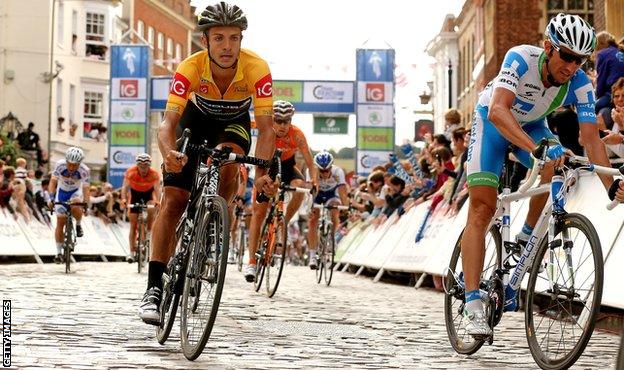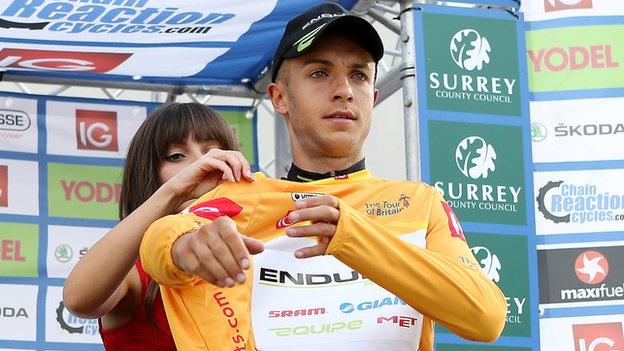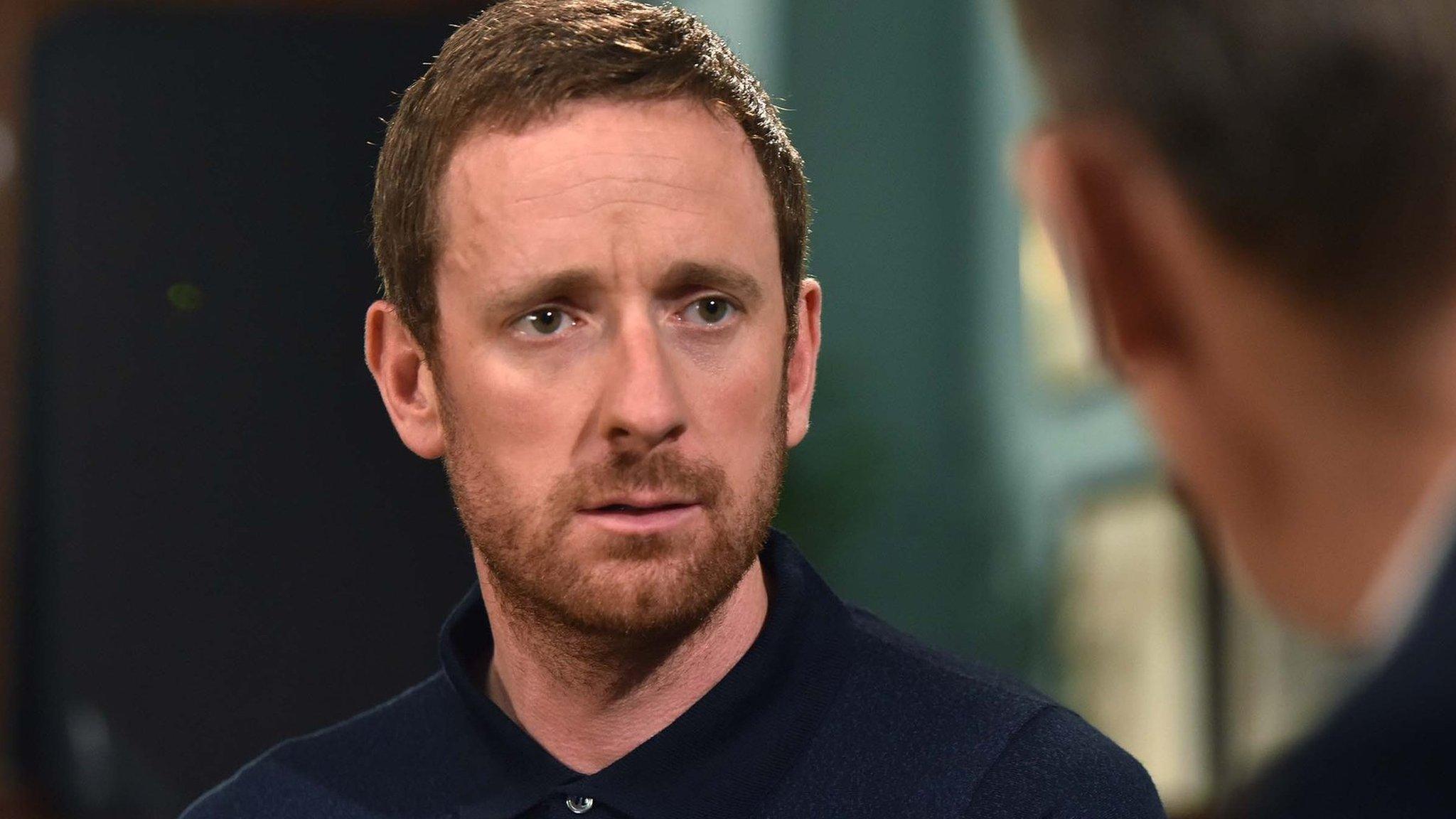Sir Bradley Wiggins: Ex-Team Sky rider questions TUE stance
- Published
Team Sky TUE stance questioned by Jonathan Tiernan-Locke
Team Sky's stance in allowing Sir Bradley Wiggins to take a banned drug to treat his asthma has been questioned by one of their former riders.
Jonathan Tiernan-Locke, who rode for Team Sky until he was sacked for a doping violation in 2014, says the matter has tainted the outfit's image.
Wiggins was granted a therapeutic use exemption (TUE) to take triamcinolone before his 2012 Tour de France win.
TUEs let athletes take prohibited substances if there is a medical need.
In an exclusive interview with BBC Sport, Tiernan-Locke - once tipped as a possible heir to Wiggins - claims Sky have been less than transparent about the use of TUEs.
Tiernan-Locke, now 31, also discusses his own troubles, insisting he is "100%" innocent of doping despite being handed a two-year ban for irregularities in his blood passport.
Wiggins' TUE 'looks odd'
Bradley Wiggins: 'This was about putting myself back on a level playing field'
Tiernan-Locke said the matter of Wiggins' TUEs - he also took anti-inflammatory drug triamcinolone before the 2011 Tour and the 2013 Giro d'Italia - "definitely looks odd".
He added: "I don't want to insinuate anything, but the timing doesn't look great. You assume if you had a need for such a thing it would be consistent throughout his career, that you'd use it year in year out, so from that point of view it looks suspicious.
"But from the other perspective, we've got a guy who's favourite for the general classification in these big races, so for a team like Sky who are so thorough, they don't want to leave anything to chance so why risk these allergies derailing their best-laid plans, so I understand it."
Tiernan-Locke is the first former Team Sky insider to speak out about the controversy.
Wiggins' use of the substance has come under scrutiny following revelations made by computer hackers known as the Fancy Bears, who are thought to be from Russia.
The cyber-espionage group accessed the private medical data of some of the world's leading athletes from the World Anti-Doping Agency (Wada).
Wiggins' TUEs were approved by British authorities, and cycling's world governing body the UCI. There is no suggestion either the 36-year-old or Team Sky, his former team, have broken any rules.
Questions have been raised over why Wiggins apparently did not need the drug before 2011, or after 2013.
But Team Sky boss Sir Dave Brailsford has defended his former rider, saying the medication was recommended by a specialist and that Team Sky "do not cross the line" over performance-enhancing drugs.
Sir Dave Brailsford was interviewed by the BBC on 26 September
When asked if Team Sky has been tainted, Tiernan-Locke said: "That's a difficult one. For me, not personally. What Bradley won in the run up to that 2012 Tour de France win I personally believe it's a case of preventing anything that might have derailed their plans, but I do think they have become tainted.
"People I have spoken to, out of training, it has kind of tainted their image somewhat. I think their modus operandi was to put things out in the public domain and look transparent and not have anything to hide. It's somewhat less than transparent."
On his own doping sanction
Tiernan-Locke continues to insist he is innocent after he became the first British athlete to be sanctioned on the basis of abnormal blood values in his biological passport.
He insisted the discrepancy was not related to doping but was because he was dehydrated after getting drunk with his girlfriend to celebrate his move to Team Sky.
But a UK Anti-Doping panel found him guilty of using the banned blood-booster EPO and he was sacked by Team Sky.
Tiernan-Locke, who rose to prominence in 2012 when he won the Tour of Britain when riding for the Endura team, also claimed that when competing for Great Britain in 2012, he was offered a legal but controversial painkiller.
"There was a time I rode the World Championships and we were offered a painkiller called Tramadol. I wasn't in any pain so I didn't need to take it, and that was offered freely around. It just didn't sit well with me at the time. I thought, 'I'm not in any pain', why would I want a painkiller?'"
Tramadol has been on Wada's 'monitoring list' for several years, and concerns have been raised about possible side-effects, such as drowsiness potentially contributing to crashes.
Cycling's world governing body the UCI has pushed for it to be banned by Wada.
British Cycling says the doctor concerned denies Tiernan-Locke's claim.
On his return to racing
Speaking at his parents' home in Cornwall where he now lives, Tiernan-Locke said he aims to return to racing early next year.
"I'm not someone who is just going to cancel life and not move on. It's just about picking up the pieces and rebuilding," he said.
"It's such a lifestyle shift, I haven't been used to over the last couple of years. Disowning cycling, kind of being bitter about it to just embracing.
"In 2014 when the decision was made [to ban him], that was really difficult. I just wanted to go to bed and not get back out.
"I'd put so much hope in the result that I'd get cleared and be racing again, so that that was a bitter pill to swallow. But time has kind of healed that. I didn't touch a bike for ages, I thought I was done with it. Now I'm trying to put something back into the sport again."

Tiernan-Locke won the 2012 Tour of Britain title, which he was later stripped of
- Published17 July 2014

- Attribution
- Published25 September 2016
